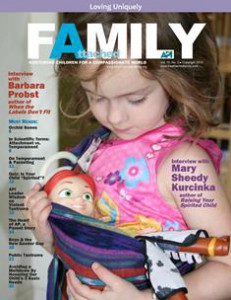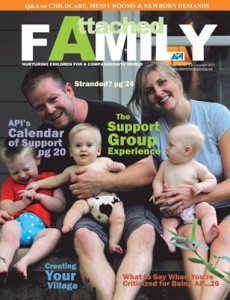By Rita Brhel, Editor of Attached Family magazine, API’s Publications Coordinator, and an API Leader (Hastings, Nebraska, USA)
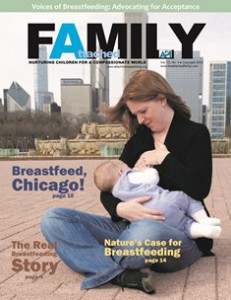 The core of Attachment Parenting is responding with sensitivity.
The core of Attachment Parenting is responding with sensitivity.
API recognizes that breastfeeding can be difficult in our society. It is hard to do something different than our family and friends, who are our social network prior to becoming parents, and to find a new support system for our choices. It is hard to navigate new motherhood relatively alone, compared to other cultures where family rallies together to give the mother a “babymoon”—a time when mom and baby can bond uninterrupted while housework and caring for other children are taken up by others in her life. It is hard to make the choice to return to work and then try to integrate a child care provider into our way of parenting. It is hard to pump while away from baby. And it is hard to continue to push through difficulties, whether they be a poor latch or milk supply issues or teething or night waking, when so many others in our lives are trying to convince us to just give a bottle of formula.
But breastfeeding, like any choice made through the lens of Attachment Parenting, is ultimately about responding with sensitivity to our babies (and toddlers). There are great nutritional and health benefits to feeding breast milk, but what makes breastfeeding special enough for many mothers to continue despite societal pressure and their personal hurdles is that breastfeeding is more than a way to feed their babies—it offers the beginnings of a relationship with their child that cannot be easily replicated another way.
The human mother was designed to breastfeed so that a relationship is borne from the effort—from the mother and her baby learning about each other and what will work or not, from the gaze between each other, from the oxytocin rush each receives, from the gentle discipline necessary in teaching baby not to bite or to eventually night-wean, from the mother finding her balance while caring for her baby, from the mother learning to be flexible as baby grows and needs change. We can find a bit of each of Attachment Parnting International’s Eight Principles of Parenting within the act of breastfeeding. Breastfeeding behavior is very literally the embodiment of responding with sensitivity to our babies—and responding with sensitivity is a skill and art form that all mothers need no matter their child’s age.
In this special edition of Attached Family, through the “Voices of Breastfeeding: Advocating for Acceptance” issue, we take a look at the cultural explosion of breastfeeding advocacy, as well as the challenges still to overcome. API writer Sheena Sommers begins this issue with “The Real Breastfeeding Story,” including a look at “Extended Breastfeeding Around the World” by API writer Rivkah Estrin, followed by API Professional Liaison Patricia Mackie’s interview with the founder of Breastfeed, Chicago! and finally, I present researcher Jeanne Stolzer as she makes “Nature’s Case for Breastfeeding.” Scattered throughout this issue are parent stories, project highlights and additional resources from around and beyond API.
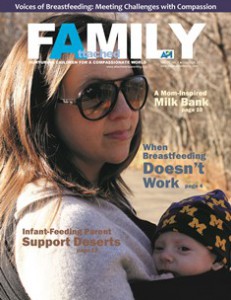 That said, not all mothers are able to breastfeed.
That said, not all mothers are able to breastfeed.
Thankfully, the key behaviors of breastfeeding can be mimicked while giving a bottle of expressed milk or formula to a baby. A mother-baby pair unable to breastfeed, therefore, is not necessarily unable to form a secure attachment. That is the beauty of Attachment Parenting.
The reason breastfeeding is considered a key element in Attachment Parenting is because it is this very act that is nature’s best teacher for new parents in how to sensitively and consistently respond to their babies, forming the foundation of reciprocity of a healthy relationship meant to serve the parent-child dyad for a lifetime.
Largely due to cultural pressures, even when mothers are able to get breastfeeding off to a good start, there is a sharp overall decline in breastfeeding rates in the weeks and months after delivery. If mothers do not have adequate support when breastfeeding problems arise, premature weaning often happens. There is even less support for teaching mothers who feed by bottle how to do so within the parent-child relationship framework.
This time of learning how to parent is crucial to the mother-infant relationship. Attachment Parenting helps mothers—whether breastfeeding or bottle feeding—view infant care in the context of the holistic parent-child relationship and learn how that give-and-take interaction that builds the foundation of secure attachment can be applied beyond feeding with love and respect.
Through the “Voices of Breastfeeding: Meeting Challenges with Compassion” in this special edition of Attached Family, we take a look at the “other side” of breastfeeding advocacy—championing compassion for the mother who encounters challenges in breastfeeding and who may not be able to breastfeed at all. API’s The Attached Family.com Editor Lisa Lord opens this issue with “When Breastfeeding Doesn’t Work,” followed by a look at a “Mom-Inspired Milk Bank” by API writer Kathleen Mitchell-Askar and the debute of API’s Parent Support Deserts project—each with accompanying parent stories (including that of Sara Jones Rust, who graces the cover), project highlights and additional resources from around and beyond API.
While we at API wish that breastfeeding was possible, and fulfilling, for all mother-baby couples, it is as Wendy Friedlander of New York City, USA, says on page 8: “In the end, it doesn’t matter because they loved her. When it comes to a situation where you are low on reserves and low on support, there is only so much one person can do. Your children are getting served by love. That is the number-one thing that serves them.”
Attached Family magazine is free for all API members–and membership is free! Click the link to download your copy or join API today.
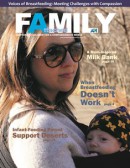 In this issue of Attached Family, we take a look at the cultural explosion of breastfeeding advocacy, as well as the challenges still to overcome. API writer Sheena Sommers begins this issue with “The Real Breastfeeding Story,” including a look at “Extended Breastfeeding Around the World” by API writer Rivkah Estrin, followed by API Professional Liaison Patricia Mackie’s interview with the founder of Breastfeed, Chicago! and finally, I present researcher Jeanne Stolzer as she makes “Nature’s Case for Breastfeeding.”
In this issue of Attached Family, we take a look at the cultural explosion of breastfeeding advocacy, as well as the challenges still to overcome. API writer Sheena Sommers begins this issue with “The Real Breastfeeding Story,” including a look at “Extended Breastfeeding Around the World” by API writer Rivkah Estrin, followed by API Professional Liaison Patricia Mackie’s interview with the founder of Breastfeed, Chicago! and finally, I present researcher Jeanne Stolzer as she makes “Nature’s Case for Breastfeeding.”

